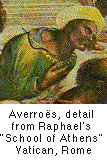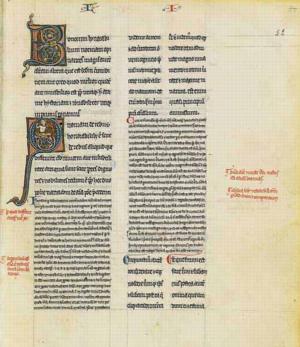Abu al-Walid Muhammad ibn Ahmad ibn Muhammad ibn Rushd (Latin: Averroës)
Islamic philosopher, b. 1126 (Córdoba), d. 1198 (Marakech).
 Ibn Rushd, known mainly under his Latinized name Averroës, belonged to an established family of Córdoba; his grandfather had been qadi (judge) under the Almoravid caliphs. He was taught in the core Islamic sciences (Qu'ran, Traditions and Law), followed by medicine and philosophy, and was appointed chief qadi of Córdoba.
Ibn Rushd, known mainly under his Latinized name Averroës, belonged to an established family of Córdoba; his grandfather had been qadi (judge) under the Almoravid caliphs. He was taught in the core Islamic sciences (Qu'ran, Traditions and Law), followed by medicine and philosophy, and was appointed chief qadi of Córdoba.
During Averroës' lifetime the Arabian empires had passed their golden age, and conflict between competing dynasties expressed itself in rising religious zeal and intolerance. In 1148 the north African Berber dynasty of the Almohads captured Córdoba, deposed the Almoravid caliph and forced everyone to convert to Islam or leave the city.
Between 1162 and 1169 Averroës wrote Kulliyat ("General Medicine;" Latin Colliget), which led to his introduction to the Almohad caliph Abu Yaqub. During a lengthy philosophical discussion the caliph asked him whether the heavens were created or not. Averroës, frightened by the consequences of the wrong answer, was relieved when the caliph gave the answer himself. Soon after, the caliph ordered him to provide a correct interpretation of Aristotle's philosophy.
During the next 25 years Averroës, who continued to work as chief judge and from 1182 was also the caliph's personal physician, wrote commentaries on most of Aristotle's works and used Plato's Republic as a commentary on Aristotle's Politica, which was inaccessible to him.
Averroës' position was not an enviable one. His official task was to come up with an interpretation of Greek philosophy that would fit into Islamic teaching; but unlike many theologians of the time he was too much an honest intellectual and refused to subjugate free philosophical thought to religious dogma.
His writings contain various attempts at a solution. During 1179 and 1180 he wrote Fasl ("Decisive Treatise on the Agreement between Religious Law and Philosophy"), Manahij ("Examinations of the Methods of Proof Concerning the Doctrines of Religion") and Tahafut at-tahafut ("The Incoherence of the Incoherence"), which suggest that only philosophy can interpret the doctrines and reveal the inner meaning of religion but should not be revealed to the masses.
Later philosophers, known as the Latin Averroists, claimed that Averroës taught a double truth, philosophy for the metaphysician and religion for the masses. Averroës himself always saw religion as the only truth and stated that the philosopher must always choose the best religion, which for him was Islam, as Christianity was at the time of Jesus and Judaism at the time of Moses.
In his commentary on Plato's Republic Averroës agreed with Plato's position that the ruler of a state should be a philosopher or, as Aristotle said, at least be guided by philosophers and described Plato's state as the second best, inferior only to the ideal Islamic state. He used Plato's model state to criticize feudal Almoravid and Almohad rule. He also added new elements of critique, expressing disapproval of the treatment of women under Islam. In Averroës' view restricting the role of women to childbearing and to the bringing up of children keeps the economy back and is a cause of state poverty.
Averroës was a man of great intellect and upright character born into the wrong time, who would probably have achieved much more under different circumstances. The Greek civilization had progressed to the separation of philosophy-science from religion. Averroës tried hard to achieve the impossible and prove the unity of philosophy and religion. Despite his efforts he was attacked by theologians throughout his life and in 1195 banished from the capital for a while.
Reference
Rosenthal, E. I. J. (1994) Averroës. Encyclopaedia Britannica 15th edition.
The illustration below shows a page from Averroës' Commentary on Aristotle's De Anima. The work was translated into Latin by Michel Scot and published in Paris around 1230 under the title
Commentarium magnum Averrois in Aristotelis De Anima libros.

home
 Ibn Rushd, known mainly under his Latinized name Averroës, belonged to an established family of Córdoba; his grandfather had been qadi (judge) under the Almoravid caliphs. He was taught in the core Islamic sciences (Qu'ran, Traditions and Law), followed by medicine and philosophy, and was appointed chief qadi of Córdoba.
Ibn Rushd, known mainly under his Latinized name Averroës, belonged to an established family of Córdoba; his grandfather had been qadi (judge) under the Almoravid caliphs. He was taught in the core Islamic sciences (Qu'ran, Traditions and Law), followed by medicine and philosophy, and was appointed chief qadi of Córdoba.